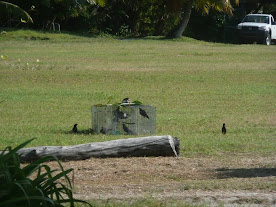The Seychelles Sunbird (Nectarinia dussumieri) is endemic to the central Seychelles archipelago and is often cited as the endemic species that has best adapted to, or perhaps even benefited from, man-induced habitat changes.
The status of the sunbird on Denis Island, however, is not so clear. Fryer, recorded sunbirds as present on the island in 1907[1] as did Stoddart following a visit in 1977. Hill however, found no sunbirds and described the species as “apparently extinct” following a survey in 2001. Discussion with island residents revealed anecdotal sightings of the bird in the mid-nineties from the areas called Bois D’Argent and “Miray Bondye” and somewhat less credible claims of the birds being regularly seen at the site of the old hospital (see map3).
In July 2007 however there was a confirmed sighting of a single male sunbird (Feare, C. and Nevill, J) at the abandoned house at Miray Bondye. It was suggested at the time that the bird may have come from Bird Island where a population of Sunbirds had very recently been introduced, but the bird seen by Dr Feare and myself had no rings therefore discounting this option. Dr Feare was able to take some partial photographs of the bird in a tree canopy (see sidebar).
Perhaps the species has been reduced to and maintained very low numbers on the island, for reasons that are unclear as suitable habitat appears to be relatively abundant, resulting in only occasional sightings. Or perhaps the population was extirpated in the past and has recently re-colonised or is subject to occasional visitation from Aride Island. Regardless the status of the population is unclear and numbers, if there is indeed a resident population remain very low.
The opening of an environmental information centre on the island, in the coming months, will provide a basis to better engage guests and staff in the search for and hoped for confirmation and whereabouts of a population on the island.
[1] In fact Fryer recorded the sunbirds as being of the Aldabran species (N. sovimanga) though this is now widely accepted as an error.
Subscribe to:
Post Comments (Atom)

























No comments:
Post a Comment